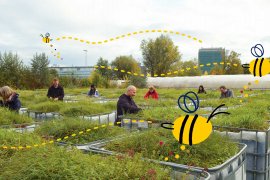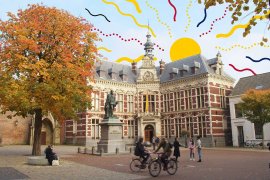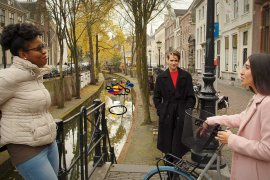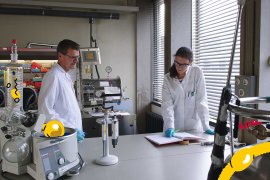Faculty of Geosciences
Groundbreaking research and education for a sustainable Earth
Jump to:
Faculty profile
The Faculty of Geosciences has the ambition to be a global trailblazer in education and research with regard to our Earth system and sustainability, from the local to the global scale. Education and research should take place in an open and inspiring environment, with room for creativity, debate and critical reflection. We pursue disciplinary innovation and encourage interdisciplinary collaboration. In the coming decades, society will face the challenge of actualizing major transitions, such as those relating to the energy supply, water management, adapting to climate change and the quality of our living environments. Consequently, sustainability will be the central priority and overarching theme for our education and research in the coming strategic period. We also actively seek out cooperation with social partners and envision ourselves playing an active role in the societal debate.
Sustainability will be the central priority and overarching theme for our education and research in the coming strategic period.
Our unique combination of expertise in both natural and social sciences in a single faculty will enable us to achieve our ambitions. In the decisions we take, we consider the strategic themes, particularly Pathways to Sustainability. Through research along these themes and through multidisciplinary education, the Faculty of Geosciences continues to realise the university ambitions aimed at facilitating the sustainable development goals (SDGs) formulated by the United Nations. The concept of sustainability and the SDGs are vast in scope: besides ecological sustainability, economic and social sustainability – and other forms – are important as well. In the period ahead, we will enter into further discussion with one another and with partners from outside the university in order to define these concepts and, on that basis, to further develop our knowledge and educational agenda.
We actively involve societal players in order to achieve meaningful impact through scientific knowledge.
We are contributing to the ambitions of Utrecht University by strengthening the connection between the natural science and social science disciplines. The Faculty of Geosciences aspires to be a leading institution in disciplinary research and to excel in forging connections between disciplines, not only within the faculty but across the university and in collaborations with external partners. We actively involve societal players in order to achieve meaningful impact through scientific knowledge. We enter into alliances with our national and international knowledge partners that include joint research programmes and dual appointments. This allows us to bring in knowledge that complements our own and to prepare ourselves for new future societal challenges that are, perhaps, not yet sufficiently evident today. Our unfettered and independent research will also generate new themes.
Internal and external connections lead to the new interdisciplinary insights required to address major societal challenges such as climate change, sustainability, inequality, health and digitisation. Through these connections, we continue to build on our knowledge and education with regard to planet Earth as a complete system, from deep within the Earth's core to the atmosphere, and to expand our expertise regarding social processes such as social inequality and migration. In doing so, we will also build on the high-quality infrastructure of our laboratories in order to retain our top global position.

With regard to our education, in the coming period we will devote greater attention to multidisciplinarity, building on the existing strong foundation we have established in previous years. The geo-student of the future must be ready to face a shifting international job market. It is partly for this reason that we are reinforcing our skills-oriented education, focusing on skills such as collaboration and knowledge of digital methods and techniques. We are developing new teaching methods such as challenge-based learning, and we offer students flexibility to make their own choices regarding deepening or broadening their expertise. In our education, we strive to optimally prepare students to contribute to solutions for the challenges of the 21st century.
The guiding principle is that we continue to stand for high-quality degree programmes and research, while focusing our attention on collaboration, encounters and debate.
The COVID-19 pandemic has had a major impact on our education and research. It is imperative that we learn from our experiences related to this pandemic. The guiding principle is that we continue to stand for high-quality degree programmes and research, while focusing our attention on collaboration, encounters and debate. This will require investments in new forms of cooperation and the use of novel technologies.
The Faculty of Geosciences embraces the principles of Open Science. Geoscientists firmly believe that scientific knowledge must be shared openly with their scientific colleagues and the broader public in order to realise an even greater positive impact. Cooperation between scientific disciplines and with societal partners calls for a culture of knowledge sharing. We are working to develop an agenda aimed at improving data sharing and making our research transparent and reproducible.
Our goal is to continue working toward a diverse and inclusive environment in which all employees and students are challenged to pursue their own professional development.
The Faculty of Geosciences should remain an attractive workplace and an appealing learning environment for employees and students. Our goal is to continue working toward a diverse and inclusive environment in which all employees and students are challenged to pursue their own professional development. We are committed to fostering a strong community that is characterised by equality, diversity, inclusion, openness, and trust. We are committed to fostering greater diversity in talent; continuing to work on a culture of appreciation and reward; and paying heed to the well-being of our students and employees.
Meeting our faculty's ambition goals will require a resilient and agile organisation guided by the principle that the faculty must remain financially sound. We are investing in reinforcing the support organisation in order to realise the ambitions. That means that the Faculty Office services have access to the expertise and instruments that enable the Faculty Board and the departments to take sound decisions. The Faculty Office staff will provide solicited and unsolicited advice on the course of action in relation to available resources and laws and regulations. To that end, the Faculty Office and the departments cooperate intensively based on a shared responsibility, with respect for one another and for equality. A smart and innovative organisation, transparency and capitalising on employees’ ideas are guiding principles in this regard.
Organisation
The Faculty of Geosciences is pursuing effective collaboration between academic and support staff, as well as between the Faculty Office and the departments, in order to achieve optimal coordination between the primary process and support, guided by the faculty strategy as underlying principle. Together, we are establishing – and implementing – priorities for policies and improvements in the faculty. In doing so, we are making use of the diversity of ideas and problem-solving abilities among our employees. Important conditions for effective collaboration are engagement, mutual respect and equality. Transparency and streamlined internal communication are also necessary in that regard.
In order to facilitate and support our ambitions and primary process of education and research in an effective and timely way, we are continuing our efforts to improve our operational management. We are assigning opportunities for self-management, along with the corresponding tasks, responsibilities and authorities, in a clear fashion and in the right places within the faculty and the departments. Operational management and support teams are strengthening their advisory role and deployability while optimising their working methods by streamlining and/or digitising processes. Specific ambitions are to support the departments in strategic staff planning, to implement the revised promotion policy and to deliver up-to-date, uniform management information for the departments and Faculty Board. Being a good employer and maintaining a financially sound organisation continue to be necessary starting points for success.
We will materialise the development opportunities for support staff through learning and training, along with a corresponding development plan. We will provide opportunities to identify the skills needed in relation to the ambitions, and to further develop those skills. Team-building is important in this regard. The Faculty of Geosciences is focusing on sustainable employability by developing targeted policy in the coming years and by promoting the health and well-being of its employees. We take indicators of excessive workload seriously and take action to address such signs by improving the management of workload.
The Faculty of Geosciences’ ambitions in relation to sustainability are not limited to its education and research. The faculty also aspires to take on a pioneering role within the university with regard to sustainable operations. To that end, we are refining the faculty's sustainability goals – for instance, by reducing CO2 emissions by minimising air travel, a sustainable purchasing policy, paperless offices and teleconferencing.
Education
The Faculty of Geosciences places high priority on contact teaching and regards direct interaction between students and lecturers and between students and their peers as essential for successful learning. With a proper balance between contact teaching and teaching methods that focus on e-learning and the use of innovative educational software, so-called blended learning, we will enhance learning outcomes. We are working to identify opportunities for improving blended learning by reflecting on and learning from our experiences during the COVID-19 pandemic and based on insights into how today's students learn. This is how we are positioning blended learning as an inextricable part of our high-quality education.
We are positioning blended learning as an inextricable part of our high-quality education.
The faculty will continue to invest in education aimed at in-depth disciplinary knowledge and at learning to acquire knowledge through fundamental research. We will also continue to design interdisciplinary education, as society calls for such education. To that end, we will further develop and apply concepts such as challenge-based learning and community-engaged learning. Students will be taught to find solutions for societal challenges through collaboration with students, lecturers, and experts from outside the university. We are developing interdisciplinary courses for the optional course profile and restructuring minors offered within the faculty. In doing so, our investments meet a strong desire from students to better align with the job market. We are exploring whether there is sufficient interest in a faculty-wide, interdisciplinary programme and whether such a programme would be thematically distinct compared to existing curricula.
We are also taking a critical look at the skills students will need in the job market of the future. We are expanding our current skills-oriented learning pathways where needed. This includes special attention to intercultural skills, the ability to work effectively in a team, reflection skills and making use of digital technologies, including working with and applying Artificial Intelligence and large and complex data sets.
We will therefore continue to invest in lecturer professionalization.
Lecturers with fitting knowledge and skills are needed if we are to achieve the aforementioned ambitions. We will therefore continue to invest in lecturer professionalisation in an environment and structure in which lecturers are able to further develop their talents and skills by working together and learning from one another. In our efforts to recruit new lecturers, we are – to an even greater extent than in the past – looking for talent and excellence in providing education.
The Faculty of Geosciences strives to foster a student population that accurately reflects the diversity in society and wants to create an inclusive environment in which every student feels like they are a part of the degree programme and the faculty. In the various programmes offered by the faculty, students are introduced to a wide range of perspectives in terms of culture and background. Students also feel challenged to contribute to the academic discourse. Concretely, we are achieving this through several lines of action. We are increasing the diversity of incoming students by removing obstacles to enrolment where necessary and we include diverse perspectives in our curricula. We are investing in community-building, with activities that allow students to get to know one another in the context of their programme or elective courses or minors, but also outside these study-related activities.
We use our expertise to develop educational programmes for professionals. Our range of programmes is expanded to include post-graduate education. The new modules build on past experiences in mixed class rooms, with blended learning and with the online education that has been developed. Professional Education will become a permanent component of the degree programmes of the Faculty of Geosciences and will (continue to) contribute to the societal impact of our research.
Research
The Faculty of Geosciences trains researchers and conducts research that allows to make meaningful contributions to addressing societal challenges, with a strong emphasis on sustainability. To guarantee world-class research, we have adopted a selective policy: we invest in efforts to attract undisputed scientific talent at the levels of PhD candidate, postdoc and assistant professor, along with top-tier scientists at the associate professor and full professor levels. The faculty will further invest in excellence and talent with regard to interdisciplinary research in order to become global leaders in this area as well.
We invest in efforts to attract undisputed scientific talent.
The Faculty of Geosciences is extremely well-equipped to combine curiosity-driven research with mission-driven research, and in doing so, to contribute to societal impact. We intend to capitalise more effectively on our acquisition opportunities. This will require more intensive cooperation within and between the departments. This is why we are making additional investments in the organisation of seminars, workshops and debates. Together with the departments, the Faculty of Geosciences will further develop the means for supporting project acquisition. We will also train and coach researchers in their potential role concerning promoting the societal impact of scientific research. We expect research leaders within the faculty to maintain an attitude that contributes to successful team-building.
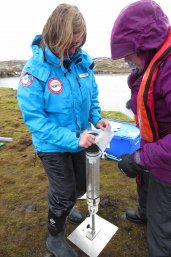
In addition to more intensive collaboration within the faculty and Utrecht University, successful collaboration with other research institutes in the Netherlands and abroad is also vital in order to permanently ensure the world-class quality of our research. We ask that our research groups enter into strategic alliances with a limited number of leading international institutes, or become a member of existing alliances. This need not be limited to research but may extend to the teaching domain as well. Alliance partners conduct joint research efforts, create opportunities for staff exchanges and organise leading conferences and seminars. In this way, we exert an important influence on developments in the particular field of research.
In the coming years, the research projects of the Faculty of Geosciences will be characterised by Open Science. Open Science has various objectives, including promoting the involvement of societal partners or the broader public in research. It also pertains to the sharing of research data (in keeping with FAIR principles), open access publications, promoting the reuse of data and making results reproducible and therefore more reliable. We intend to continue working on an agenda for promoting Open Science at the faculty.

